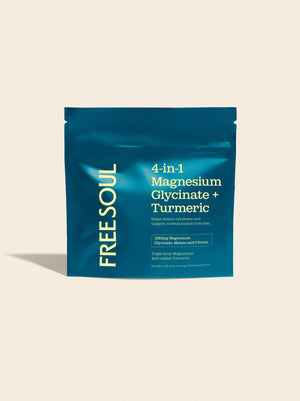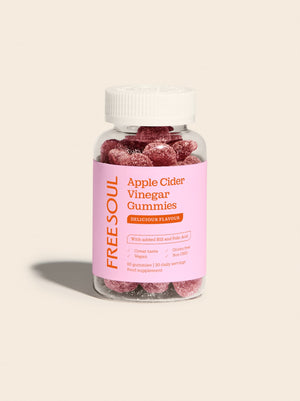Suffering from PCOS? You’re not alone. Affecting almost 20% of British females, PCOS is the most common hormonal condition among women of reproductive age. Despite its prevalence, many women feel totally overwhelmed, isolated and misunderstood when navigating their diagnosis and managing their symptoms.
Managing PCOS requires a multifaceted approach, including gut support, circadian rhythm support, diet, sleep, movement, stress management, emotional wellbeing and a positive mindset. The good news is, there are ways to help manage and alleviate your symptoms. We’re breaking down everything you need to know - plus how myo-inositol could help you on your journey.
PCOS is characterised by an imbalance in hormones, which can cause irregular periods, excessive facial and body hair growth, and acne. Women with PCOS may also have multiple small cysts on their ovaries.
While the exact cause of PCOS is unknown, there are several factors that can contribute to its development, including genetics, insulin resistance, and inflammation. PCOS can also be associated with a higher risk of other health issues, such as type 2 diabetes, high blood pressure, and heart disease - which makes getting on top of your lifestyle, to manage your symptoms, essential.
Symptoms of PCOS can vary for each of us individually, and can also range from mild to severe. Some women may only experience irregular periods, while others may suffer from more severe symptoms, such as infertility and weight gain.
If you have been diagnosed with PCOS, there are several treatment options available. Finding a doctor who you feel understands and supports your journey and choices to manage your symptoms can help you feel more on top of your approach. While medication and lifestyle changes are commonly recommended, there are also natural remedies that can help alleviate symptoms and improve your overall health.
One natural remedy that has gained popularity in recent years is myo-inositol. A type of sugar that is found naturally in many foods, such as fruits, beans, and grains, myo-inositol is also available as a supplement that’s often used to help treat PCOS.
So, what exactly is myo-inositol and how does it help with PCOS symptoms?
Myo-inositol is a type of inositol, which is a group of molecules that are similar in structure to glucose. Myo-inositol is the most common type of inositol found in the body and plays an important role in many biological processes, including insulin signalling and ovarian function.
Research has shown that women with PCOS often have lower levels of myo-inositol in their bodies, which may contribute to insulin resistance and other hormonal imbalances. By supplementing with myo-inositol, women with PCOS may be able to improve insulin sensitivity and reduce the severity of their symptoms.
Studies have also shown that myo-inositol may help improve fertility in women with PCOS. In one study, women who took myo-inositol supplements had a higher rate of ovulation and pregnancy compared to women who did not take the supplement.
In addition to myo-inositol, there are several other natural remedies that can help alleviate PCOS symptoms. We’re breaking down how to get a handle on your diet, sleep, stress and exercise…
Eat a healthy and balanced diet: Changing the way you eat is a big part of PCOS management, but it isn’t just about losing weight, many of the symptoms are a result of hormonal imbalances and these can be helped with a carefully tailored diet. A diet that is rich in whole foods, such as fruits, vegetables, whole grains, and lean protein, can help improve insulin sensitivity and reduce inflammation. Avoiding processed foods and sugary drinks is also important for managing PCOS symptoms. Protein will help your body to stabilise blood glucose, reduce insulin and androgens, keep you feeling fuller for longer and put you in control of your appetite. Opt for lots of plant-based protein sources like soya products, legumes, pulses, nuts, seeds and wholegrains (and your Free Soul Vegan Protein Powder) opposed to animal products, which can promote insulin resistance and inflammation.
Exercise regularly: Regular exercise can help you to improve insulin sensitivity and reduce the risk of developing type 2 diabetes. It can also help with weight management, which is important for women with PCOS. Moderate-intensity workouts (at least 30 minutes, three days a week) have been proven to reduce insulin resistance and aid weight loss. Studies have shown that in people with PCOS, lifting weights can improve ovulation, reduce insulin resistance and promote weight loss as it lowers insulin and excess oestrogen and reduces testosterone.
Manage stress: Chronic stress can increase inflammation in the body and exacerbate PCOS symptoms. Practising relaxation techniques, such as yoga and meditation, can help reduce stress and improve overall health.
Get enough sleep: Sleep is important for overall health and can also help regulate hormones. PCOS can affect sleep, cause fatigue and trigger low mood. Aim for 7-8 hours of sleep each night to help manage your symptoms.
While natural remedies can be helpful for managing PCOS symptoms, it is important to work with your doctor to develop a comprehensive treatment plan that works for your lifestyle and needs. Your provider can help determine the best course of action based on your individual needs and health history. Opting for medication if you’re not able to implement lifestyle changes is totally ok, always remember to do what’s best for you and your own individual journey.
If you’ve been diagnosed with PCOS, we know it can be difficult and life-changing. We’re not only surrounded by women navigating their way through similar, confusing symptoms, we’re also here to help you too. Discover the Free Soul Myo-Inositol supplement here.











